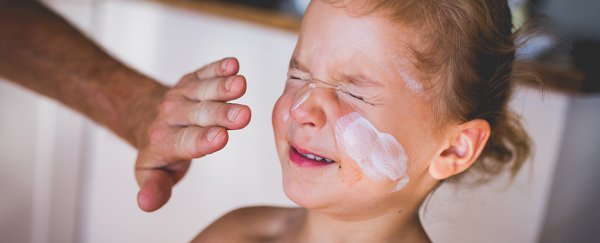Owners of companies marketing 'sun-protection' pills have been warned by the US Food and Drug Administration (FDA) to cease making spurious claims, or risk breaking the law.
Meanwhile the FDA also has a word of warning for the rest of us; a number of methods have been proven to reduce the risk of damage posed by the Sun's UV radiation, and dietary supplements just aren't one of them.
Four products have been specifically called out by the recent statement: Advanced Skin Brightening Formula by GliSODin Skin Nutrients, Sunsafe Rx by Napa Valley Bioscience, Solaricare by Pharmacy Direct, and Sunergized LLC's Sunergetic.
It's claimed that by taking these nutritional supplements, consumers can reduce the risks posed by UV radiation
For example, Napa Valley Bioscience claims, "Sunsafe Rx is a nutritional supplement with ingredients shown to protect your skin and eyes from the sun."
Chowing down on dietary supplements to make your skin look nicer seems to be big business these days. And the science behind it all is a little thin.
But make no mistake – these companies aren't just referring to vague claims of making tired old skin look less blotchy or wrinkled, or even selling vitamins that just might help an undernourished body heal from a weekend at the beach.
A company representative from Napa Valley Bioscience told TIME, "Sunsafe Rx is made with ingredients that published clinical studies show protect skin from damage."
Admittedly, they argue that they don't promote their supplements as sunscreen, reminding us that we all should "exercise caution when exposed to the sun."
While that might technically be true, that message doesn't seem to have filtered down to their enthusiastic clients, and it seems they're not shy about sharing it.
The FDA cites a review on a Sunsafe Rx promotional page, "I don't burn as I used to, as I would notice sunburn after only being in the sun for 15 or 20 minutes before using the product…."
An even more worrying review of Sunergetic promoted by Sunergized was claimed to state, "It's basically an oral sunscreen…This would be especially useful for people who have had skin cancer, are at risk for skin cancer…."
This is serious stuff.
A search for 'edible' skin cancer protection has been around for a while now, and there have been tantalising leads. So the basic idea itself isn't ridiculous.
But there is a world of difference between mouse studies that suggest a small increase in protection from skin cancer and an 'oral sunscreen' that ticks all of the boxes.
For all of the scientific-sounding jargon on the company's pages and references to clinical studies, the FDA isn't convinced that there is sufficient evidence showing sunburn can be prevented to any significant degree by supplementing your diet.
"We've found products purporting to provide protection from the sun that aren't delivering the advertised benefits," the FDA states.
"Instead they're misleading consumers, and putting people at risk."
High doses of UV light do more than turn your skin an ugly shade of pink; they break apart DNA in growing skin cells, raising the risk of cancerous mutations.
Skin cancer is among the most common of cancers, with the more deadly forms of it on the rise.
More than 9,000 people are expected to die in the US this year from melanoma, and it's a problem the FDA are taking seriously by clarifying guidelines on what constitutes solid evidence of efficacy in sunscreens.
The bottom line for the rest of us is to not take unnecessary risks when it comes to sun exposure.
Wear a hat, sunglasses, and a collared shirt. Use a topical lotion with the highest sun protection factor you can find. Limit your time in direct sunlight.
And, remember, no pill or capsule can replace your sunscreen.
